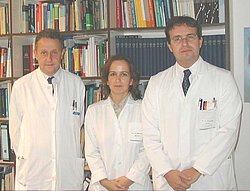Efficacy and safety of levodopa treatment in patients with hereditary spastic paraplegia (HSP)
Applicant:
PD Dr. Jan Kassubek - Oberarzt in der Neurologischen Universitätsklinik Ulm Universität Ulm, Klinik und Poliklinik für Neurologie Oberer Eselsberg 45 89081 Ulm email: jan.kassubek@medizin.uni-ulm.de
A curative therapy for the hereditary spastic paraplegia (HSP) is not known yet. Besides physiotherapy, there are only symptomatic approaches and antispastic medication (such as baclofen); however, the use of these drugs is often limited by intolerable side effects.
Therefore and considering the positive effect of levodopa (L-dopa) in other disorders with the main symptom spasticity (e.g. spastic cerebral palsy), the present study was planned. The aim is to investigate if L-dopa is able to improve mobility and life quality by reducing spasticity in HSP.
Thirty patients with uncomplicated HSP are to be included. In a randomized and double-blind design, 15 patients will receive L-Dopa 3 times daily over a period of 60 days, the other 15 patients will receive a placebo. At the first two days of the study, at the 21st and between the 58th and 60th day, there will be examinations at the Department of Neurology, University of Ulm, including detailed physical examinations according to a standardized protocol as a longitudinal comparison of the neurological symptoms. Furthermore, data of effects on life quality or potential adverse effects will be acquired to investigate the efficacy and safety of L-dopa.





